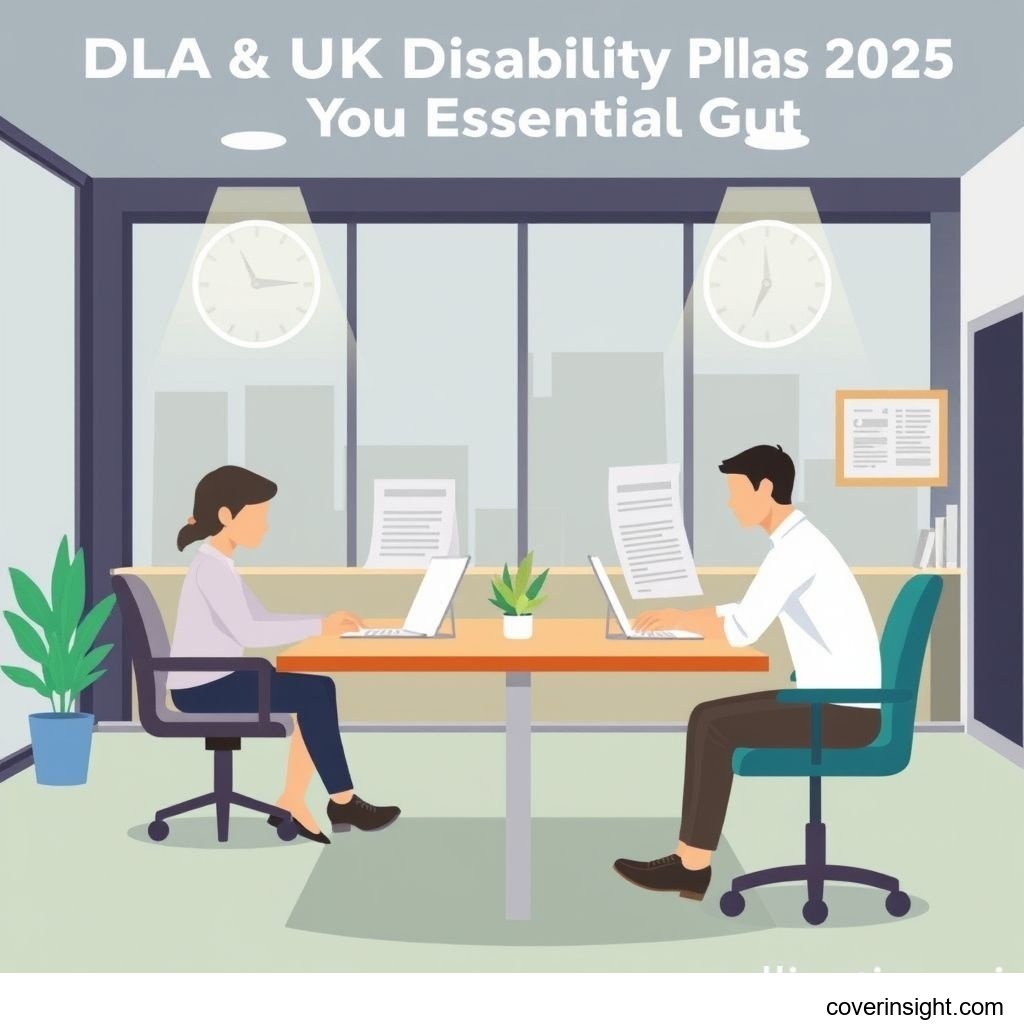UK Disability Cover 2025: Employer vs. Individual Plans
Introduction
As we look towards 2025, understanding your options for disability cover in Great Britain has never been more crucial. Life's unexpected turns, whether through illness or injury, can significantly impact your ability to earn a living. Navigating the world of disability insurance can feel like a bit of a minefield, with a key distinction lying between plans offered by employers and those you might arrange individually. Both pathways aim to provide a financial safety net, but they differ considerably in terms of scope, cost, and flexibility. This guide will help you unpack these differences, empowering you to make an informed choice for your future financial security.
Coverage Details
Choosing the right disability cover means understanding exactly what you're signing up for. It’s not just about having a policy; it’s about having the right policy for your circumstances.
What’s Included
Disability cover in the UK typically falls into a few categories, designed to replace a portion of your income if you're unable to work due to illness or injury. The most common form is Income Protection Insurance. This pays out a regular, tax-free income if you can't work due to any illness or injury that prevents you from doing your job, until you can return to work, or until the policy term ends (often retirement age). Policies usually include a "waiting period" (also known as a deferred period), which is the length of time you must be unable to work before payments begin – this can range from a few weeks to a year.
Some policies might also incorporate or be bundled with Critical Illness Cover, which pays a tax-free lump sum if you're diagnosed with a specific serious illness listed in the policy, such as cancer, heart attack, or stroke. While not strictly "disability cover" in the income replacement sense, it provides a crucial financial cushion during a challenging time. Employer-provided schemes, often called "Group Income Protection," typically offer a percentage of your salary for a defined period, and can be quite comprehensive. Individual plans, on the other hand, offer more customisation, allowing you to tailor the payout amount and waiting period to your specific needs.
Common Exclusions
It’s equally important to be clued up on what isn’t covered. Like any insurance product, disability cover comes with its fair share of exclusions. Common ones include:
-
Pre-existing medical conditions: If you had a health issue before taking out the policy, it might be excluded or subject to specific terms. Always disclose your full medical history.
-
Self-inflicted injuries or conditions: This includes injuries sustained from drug or alcohol abuse.
-
Conditions arising from criminal acts: No surprise there.
-
Certain high-risk activities: Things like professional sports, aviation, or dangerous hobbies might be excluded unless you declare them and potentially pay an additional premium.
-
Cosmetic surgery complications: Generally not covered unless medically necessary.
-
Overseas residency (for some policies): If you move abroad, your policy terms might change or become void.
Always read the policy’s terms and conditions with a fine-tooth comb. What seems like a minor detail could make all the difference when you're in a bit of a pickle.
Cost Analysis
When it comes to disability cover, the price tag can vary wildly, whether you're getting it through your employer or going it alone.
Price Factors
Several factors play a significant role in determining your premiums:
-
Age: Younger applicants generally pay less as they are statistically less likely to make a claim.
-
Health and Medical History: Good health and no pre-existing conditions mean lower premiums. Insurers will often require a medical questionnaire or examination.
-
Occupation: High-risk jobs (e.g., construction, offshore work) will naturally command higher premiums than office-based roles due to increased risk of injury.
-
Lifestyle: Smoking, high alcohol consumption, and certain dangerous hobbies can push up costs.
-
Coverage Amount and Term: The more income you want to protect and the longer the policy term, the higher the premium.
-
Waiting Period: A longer waiting period (the time before benefits kick in) will result in lower premiums, as the insurer is less likely to pay out for short-term illnesses.
-
Inflation Linkage: Opting for your payout to increase with inflation will also increase your premium.
Employer-sponsored schemes often benefit from the power of bulk buying, meaning the employer secures a group rate that is typically much lower than what an individual could get on their own. This can make them an incredibly attractive benefit.
Saving Tips
While you want comprehensive cover, you don't want to break the bank. Here are a few tips to potentially save a few quid:
-
Shop Around: Don't just take the first quote. Use comparison sites or speak to an independent financial advisor to compare policies from different providers. You can find more comprehensive information on this topic through "Insurance Resources Global".
-
Review Your Needs Annually: Your circumstances change – so should your cover. If you pay off your mortgage or your dependents leave home, you might need less cover.
-
Consider a Longer Waiting Period: If you have ample savings or a good employer sick pay scheme, opting for a 3 or 6-month waiting period instead of 1 month can significantly reduce your premiums.
-
Bundle Policies (where sensible): Some insurers offer discounts if you take out multiple policies with them, though always check if this truly offers the best value.
-
Improve Your Health: Giving up smoking or losing weight can, in the long run, lead to lower premiums when you renew or take out a new policy.
FAQs
How much does employer vs individual plans cost?
It’s tough to put an exact figure on it, as costs are highly individualised. However, employer plans (Group Income Protection) are generally much more cost-effective for the employee. Often, the employer pays the entire premium, or a significant portion, making it a "free" or very cheap benefit. In cases where employees contribute, it's usually at a subsidised group rate, which is considerably lower than what you'd pay for an individual plan. Individual plans can range from £10-£100+ per month, depending heavily on the factors mentioned above (age, health, job, cover level).
What affects premiums?
As discussed under "Price Factors", the main culprits affecting premiums are your age, health status (including medical history and smoking habits), the risk level of your occupation, the amount of income you wish to cover, and the length of the waiting period before benefits begin. The longer the waiting period, the lower the premium.
Is it mandatory?
No, in the UK, disability cover is not mandatory for individuals or employers, unlike car insurance, for example. However, for employers, offering Group Income Protection is an increasingly common benefit to attract and retain talent, and is often considered good practice for employee welfare. For individuals, while not mandatory, it’s highly recommended as a crucial part of a robust financial plan, especially if you have dependents or significant financial commitments.
How to choose?
Choosing between an employer plan and an individual plan largely depends on your personal circumstances and what your employer offers.
-
Start with your employer's offering: If they provide comprehensive income protection, this is usually your most cost-effective and often sufficient option. Understand its limits and how much of your salary it covers.
-
Assess your needs: Do you have a mortgage? Dependents? What are your monthly outgoings? Calculate how much income you’d need to replace.
-
Consider your savings: How long could you survive without an income? This helps determine your ideal waiting period.
-
Fill the gap: If your employer's plan isn't enough, or if you're self-employed, an individual plan can fill the void.
-
Seek professional advice: For a tailor-made recommendation, speaking to an independent financial advisor is always a sensible move. They can help you navigate the complexities and compare options from across the market. More resources are available on "GB Insurance Home".
Consequences of no coverage?
The consequences of having no disability cover can be severe. Without it, if you become too ill or injured to work, you would likely have to rely on state benefits (such as Universal Credit or Employment and Support Allowance), which are often significantly less than your regular income and designed as a safety net, not an income replacement. This could lead to:
-
Financial hardship: Inability to pay rent/mortgage, bills, and everyday living expenses.
-
Dipping into savings: Depleting your nest egg, potentially jeopardising retirement plans.
-
Debt accumulation: Resorting to loans or credit cards to cover essential costs.
-
Impact on family: Putting financial strain on loved ones.
-
Loss of independence: Potentially needing to rely on family or charity.
According to a 2023 report from the Department for Work and Pensions (DWP), around 16% of working-age adults in the UK (8.5 million people) have a disability. While not all prevent work, a significant number do, underscoring the everyday risk. Consider the case of Sarah, a 40-year-old marketing manager in Bristol. She enjoyed a decent salary but opted out of her company’s group income protection scheme to save a few pounds, believing "it wouldn't happen to me." When a sudden, debilitating illness left her unable to work for over a year, she quickly burned through her modest savings. Relying solely on state benefits meant a drastic reduction in her income, forcing her to sell her car and downsize her home, causing immense stress on top of her health struggles. Had she stayed in her employer’s scheme or taken out an individual policy, her financial worries would have been significantly reduced, allowing her to focus on recovery.
Author Insight & Experience
Based on my experience living in GB and observing the financial landscape, many people treat disability cover as an "it won't happen to me" scenario. It’s often seen as a luxury rather than a necessity. However, seeing first-hand the devastating impact of long-term illness or injury on friends and colleagues who lacked adequate protection really drives home its importance. It's not about being pessimistic; it's about being pragmatic. Life throws curveballs, and having that financial backstop can be the difference between maintaining your quality of life and facing a truly dire situation. I've always championed the notion that if you insure your car or your home, surely your ability to earn an income – which pays for everything else – deserves similar protection. For more regulatory information, it’s always wise to check with the "Financial Conduct Authority" and the "Association of British Insurers."








Comments